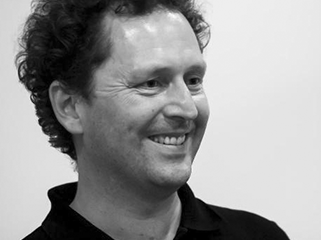Researchteam

Field of Work-Studies (Arbeitslehre) / Economy of Sustainable Consumption
In the special field of Work Studies / Economy of Sustainable Consumption, under the direction of Prof. Dr. Ulf Schrader, an interdisciplinary team is researching on topics of Corporate Social Responsibility, Sustainable Marketing, Innovation Management and the effect of mindfulness on Sustainable Consumption. Obtained research insights are incorporated into the education of teachers for the school subject of “Work-Studies”. Training and education of future school teachers is the main focus of the department, which also takes the managing role for BiNKA.

Ulf Schrader holds the chair of Economic Education and Sustainable Consumption of Technische Universität Berlin since 2008. In addition, he is since 2016 the director of the School of Education of TU Berlin (SETUB).
He studied economics, business administration, political sciences and sociology in Göttingen, Dublin and Hannover and holds degrees as “Diplom Ökonom (1995)” and “Magister Artium (2004)”. He did his PhD and his post-doc-degree (Habilitation) at the Leibniz Universität Hannover.
Ulf Schrader is the chairman of the Co-operation Council for Teacher Education of the state of Berlin. From 2011 to 2015 he was also a member of the Scientific Advisory Board of the German Federal Ministry for Nutrition, Agriculture and Consumer Protection (since 2014: Ministry for Nutrition and Agriculture) and until 2013 member of the Innovation Advisory Board of the German Federal Ministry for Economic Cooperation and Development. He is a member of the Editorial Board of the Journal of Consumer Policy.
Besides his teaching, he co-ordinated numerous research projects in the fields of sustainable consumption and corporate social responsibility. Currently (2015 – 2018), he is heading the research projects “BiNKA – Education for Sustainable Consumption through Mindfulness Training (Bildung für Nachhaltigen Konsum durch Achtsamkeitstraining)” and “IMKoN – Integrating Employees as Consumers into Sustainability Innovation Processes (Integration von Mitarbeitern als Konsumenten in Nachhaltigkeitsinnovationsprozesse)“, both funded by the Federal Ministry of Education and Research (BMBF) as part of the Social-Ecological Research (SÖF) framework. In addition, he is co-chairing the suprojects „Social Utility Value and Profession Choice Motivation for Technical-Oriented Vocational School Teachers” and „Teach-Learn-Laboratories in Work-Studies (Arbeitslehre)”, both part of „TUB-Teaching“, the joint project of TU Berlin in the framework of the “Qualitätsoffensive Lehrerbildung [Quality Campaign for Teacher Education]”.
Surgery while semester: Wed. 4.00-5.00 pm and as agreed; Surgery while semester break: as agreed. Please subscribe per Mail in order to make sure you won’t come unsuccessfully.
Ulf Schrader is from August 2017 till Februray 2018 in research semester.
Technische Universität Berlin
Institut für Berufliche Bildung und Arbeitslehre
Marchstraße 23, Room: MAR 1.016
10587 Berlin
Fon: +49 30 – 314 28769
Fax.: 030 – 314 21120
E-Mail: schrader[at]tu-berlin.de

Laura Sophie Stanszus, born 1984, studied business administration in Berlin and Singapore (BA) as well as Corporate Social Responsibility (MSc) in Nottingham, UK. In her research, she focused on the substance of sustainability in the fashion industry as well as the discourse of youth consumers about green fashion. As part of an internship in the CSR department of Ernst & Young India, she conducted a survey on the correlation between the rise in disposable income of the Indian middle-class and consumer awareness of organic food and fair trade. After her studies, Laura Stanszus helped building up the master program “Sustainability in Fashion” at the International University of Art for Fashion, ESMOD Berlin.
From March 2012 (until September 2014) on, she started working at the TU Berlin, in the project “live and work sustainably“, which was funded by the German Federal Foundation for the Environment (DBU). In the frame of the project and inspired by her own interests and experience, she developed her dissertation topic “Education for Sustainable Consumption through mindfulness training” (German acronym: BiNKA) because even though she was passionate about Education for Sustainable Consumption, she also felt the affective components of education as well as a more inclusive approach engaging the whole person were clearly missing from the discourse. In the project, she is, apart from pursuing her thesis with a qualitative study, responsible for coordination and organization of BiNKA (with Ulf Schrader). She loves yoga and meditation and is equally keen on practicing her mindfulness through enjoying lots of home baked cookies (such as: https://detoxinista.com/vegan-peanut-butter-date-cookies/) and healthyfied chocolate pudding (see: http://whatfoodcan.com/project/chocolate-avocado-mousse-video/).
Technische Universität Berlin
Institut für Berufliche Bildung und Arbeitslehre
Marchstraße 23, Room: 1.025
10587 Berlin
Fon: +49 30 – 314 73354
Fax: +49 30 – 314 21611
E-Mail: laura.stanszus[at]tu-berlin.de

Sonja Geiger studied psychology at the Humboldt Universität zu Berlin (Master in Psychology 2004) and did her PhD in cognitive psychology at the Universität Potsdam, followed by a Post-Doc position at the Cognitive Science Lab at the UWA, in Perth, Australia. The turn towards environmental psychology was paved by her practical work experience over three years in the environmental NGO “Amigos de la Tierra” (FOEI, Argentina) in Buenos Aires, Argentina. This is where she lived from 2008 to 2012 passing on her experiences with environmental problems to the first environmental-psychological research project at the UBA (Universidad de Buenos Aires). An especially lasting impression on her made the natural philosophy of the first nation people in South America, where she learned that the idea of a “good life” (from the Quechua expression “sumac kawsay”) has been based on the wellbeing of Mother Nature (Pacha Mama) for millennia. A lot of the constructs that are being researched in modern environmental psychology can be found in this philosophy (e.g. connectedness to nature, a future perspective aimed at seven generations to come or sufficiency as consumption principle, to name but a few). Since March 2015 she is bringing her research experience in these topics to the BiNKA-table. Particularly interested in the interplay between mindfulness and further factors that affect sustainable behavior, as e.g. the role of general values in life, the above mentioned future time perspective or objective knowledge of environmental issues.
In a second research project at the Ulm Universität she is researching psychological factors of sustainable clothing consumption in a living laboratory (https://www.uni-ulm.de/mawi/reallabor.html and http://dietenheim-zieht-an.de/ ). Teaching experiences span universities in different countries (Uni Potsdam, TU, SRH Germany, UWA Australia, UBA, UAI, Argentina), languages (German, English, Spanish) and subjects (Statistics and Empirical methods of the Social Sciences, Fundamentals of General Psychology, Environmental Psychology, Sustainability and Society).
Technische Universität Berlin
Institut für Berufliche Bildung und Arbeitslehre
Marchstraße 23, Room: MAR 1.017a
10587 Berlin
Fon: +49 30 – 314 28870
E-Mail: sonja.m.geiger[at]tu-berlin.de

Technische Universität Berlin
Institut für Berufliche Bildung und Arbeitslehre
Marchstraße 23, Room: MAR 1.025
10587 Berlin
Fon: +49 30 – 314 29425
E-Mail: tina.boehme[at]tu-berlin.de

Maxie Riemenschneider has been working as a student assistant for the BiNKA-project since March 2017. She finished her Bachelor of Science in Psychology at Freie Universität Berlin in 2014. She is about to finish her Masters in Clinical- and Health Psychology at Freie Universität Berlin and currently working on her master thesis within the BiNKA-project: the development and validation of the German Material Value Scale for Youth which is been used within the project. She discovered her passion for environmental psychology at her first congress for environmental psychology of the “Initiative Psychologie im Umweltschutz” (Initiative for environmental psychology). Across the years, she participated in numerous other congresses of this kind, gave and gives workshops on topics related to environmental psychology and since 2016 she is part of the executive committee of this association. Her first contact with mindfulness was in 2012, when she participated in a ten day Vipassana meditation retreat in Italy.
Technische Universität Berlin
Institut für Berufliche Bildung und Arbeitslehre
Marchstraße 23, Room: MAR 1.024
10587 Berlin
Fon: +49 30 – 314 73279
E-Mail: maxie.riemenschneider[at]tu-berlin.de


Leuphana Universität Lüneburg
The teaching focus and the main research are in theory construction and professionalisation in the field of sustainable communications (especially education, journalism and scientific communication) of the interdisciplinary team of the UNESCO Chairs Higher Education for sustainable development. The main research for Education of Sustainable Consumption (ESC) has already been deepened among SÖF-Verbundvorhaben “BINK” (educational establishment and sustainable consumption, www.konsumkultur.de), which is benefited of the Federal Ministry of Education and Research (FMER).

Leuphana Universität Lüneburg
UNESCO Chair Hochschulbildung für nachhaltige Entwicklung
Scharnhorststr. 1, Room: C14.105
21335 Lüneburg
Fon: +49 4131 – 677 2927
E-Mail: daniel.fischer[at]uni.leuphana.de

Leuphana Universität Lüneburg
Universitätsallee 1, Room: C14.104
21335 Lüneburg
Fon +49 4131 – 677 – 2920
E-Mail: michelsen[at]leuphana.de

Pascal Frank was born in 1985 in the beautiful Eifel. From 2005 to 2010 he studied cultural studies (focus: sociology) at the Fernuniversität in Hagen and as a second student in psychology at the Rheinische Friedrich-Wilhelms-Universität in Bonn. He absolved his Masters degrees in “Ethics, Responsibility and Development” (2014, University of Friborg, Switzerland) and “History, Philosophy and Sociology of Science Technology and Medicine” at the prestigious University of Cambridge. Since September 2015, Frank has been working as a teacher at the Hagen Fernuniversität in the area of Sociological Presence Diagnosis and since August 2016 as a research assistant at the BiNKA project. His research concerns in particular individual discrepancies between moral claims and actual action. In this context, he (using the example of the consumption of animal products) examines the role of affective-motivational influencing factors for the personal development of knowledge, which in turn codify concrete action. He relied on mindfulness techniques as a systematic-controlled method of introspection.
For Pascal Frank, the past eleven years have been extensive traveling years, during which he also dealt with the issue of (socially and ecologically) sustainable travel and also published it. He also worked on a voluntary basis in various institutions on the subject of sustainability (for example as president of the civil society platform “Clear up” or as a green officer at Wolfson College, University of Cambridge). Since September 2015, he has also been trained as a Iyengar yoga teacher at the Iyengar yoga institute Rhein-Ahr.
Leuphana Universität Lüneburg
Institut für Umweltkommunikation
Scharnhorststr. 1, Room: C14.113b
21335 Lüneburg
Fon: +49 4131 – 677 1347
E-Mail: pascal.frank[at]leuphana.de

Leuphana Universität Lüneburg
Higher Education for sustainable development
Institution for environmental communication
Project „LISHE – Longitudinal study about the integration of education for sustainable development on institutions of higher education”
Scharnhorststr. 1, Room: 14.105
21335 Lüneburg
Fon: +49 4131 – 677 29 36
E-Mail: anna.sundermann[at]leuphana.de

European Center for Mindfulness
The center is dedicated to deepening and expanding professional and personal experiences in dealing with mindfulness and other elements of Buddhist psychology. This is especially the case for people who already practice and use mindfulness both in their professional activities and in their personal growth. We hope that the Center will help to improve the quality of mindfulness in a professional setting. It is conceived as a place where the practice of meditation is in harmony with its Buddhist origins, and in this way is able to shape different aspects of life. In addition, the EZFA provides the opportunity for a deep exchange on how science and Buddhist psychology can be combined.

Europäische Zentrum für Achtsamkeit
Merzhauser Str. 173
DE-79100 Freiburg
Phone: +49 761 – 55729336
Mobil : +49 177 – 3478787
Funded by:


